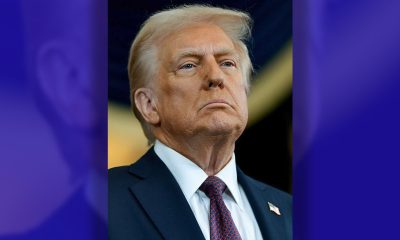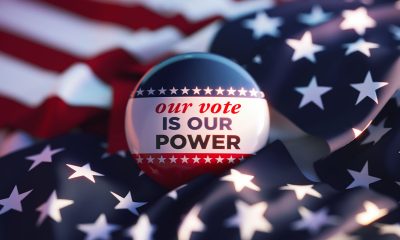Politics
Black Backer of Confederate Flag Was Anomaly in Mississippi

In this May 8, 2000, file photograph, Anthony Hervey holds a Confederate flag while standing underneath the Confederate monument in Oxford, Miss. The Highway Patrol says 49-year-old Hervey was killed Sunday, July 19, 2015, when his 2005 Ford Explorer left the roadway and overturned on Mississippi Highway 6 in Lafayette County. (Bruce Newman/The Oxford Eagle via AP, File)
EMILY WAGSTER PETTUS, Associated Press
OXFORD, Miss. (AP) — In a town where Confederate soldier statues stand sentinel on the courthouse square and a university campus, Anthony Hervey remained an anomaly — a black man who draped himself in the Confederate battle flag and publicly declared his loyalty to the secessionist Lost Cause and his belief that the Civil War was not fought over slavery.
Hervey, 49, died Sunday when the sport utility vehicle he was driving flipped into a ditch beside Mississippi Highway 6 near Oxford. He and another black Confederate supporter were returning home after speaking at an event to support a Confederate monument in Birmingham, Alabama.
The passenger, Arlene Barnum of Stuart, Oklahoma, survived and told The Associated Press that Hervey lost control of her vehicle after they were chased by a silver or gray sedan carrying four or five black men.
The Mississippi Highway Patrol is interviewing witnesses and reconstructing the crash, said patrol spokesman Johnny Poulos. The local coroner, Rocky Kennedy, said Tuesday that he was waiting for autopsy results.
Hervey was well known in Oxford and at the University of Mississippi, where students waved Confederate flags for decades to cheer the Rebels.
In Hervey’s 2006 book, “Why I Wave the Confederate Flag, Written by a Black Man,” he said the Civil War was not fought over slavery and that he was supporting black soldiers who fought for the South in the Civil War.
Even people who had known Hervey for years say they didn’t always understand him.
Randal McJunkins, 47, said he and Hervey had known each other since they were Oxford High School students in the 1980s and they had played basketball together in recent years. McJunkins called Hervey by his nickname Tony, and described him as smart and opinionated.
“He was different, I can say that,” McJunkins said. “If you knew him, you knew what to say to him, what not to say to him.”
McJunkins, who is black, recalled seeing Hervey around Oxford wearing a Confederate uniform and waving a flag. Several years ago, Hervey walked about 25 miles from Oxford to Batesville carrying a large rebel flag.
“I always wanted to ask him, what was the deal with that,” McJunkins said Monday.
In 2000 and 2001, Hervey made several appearances around Mississippi, speaking against a proposal to remove the Confederate battle emblem that has been on the state flag since Reconstruction. State voters decided in 2001 to keep the flag design, but now some people are saying the issue should be reconsidered.
Barnum said organizers of Saturday’s Alabama event had asked her to give Hervey a ride there. She said she didn’t know him previously.
Barnum and Hervey both spoke at the rally, and Barnum said she burned an NAACP membership card during her speech. A video shows the crowd cheered when Hervey said he doesn’t like black people or white people, “but I love me some Southerners.”
The public display of Confederate symbols has come under fresh scrutiny since the June 17 massacre of nine black worshippers at a church in Charleston, South Carolina. The white man charged in the killings had posed with a Confederate battle flag in photos posted online before the attack.
At the Alabama rally, Hervey called attempts to remove Confederate symbols and monuments “an assault on working-class people.”
Hervey also said: “You know what white guilt is? If I can accuse you of something you ain’t have nothing to do with, and I do it long enough and I put on ‘Twelve Years a Slave’ and ‘Mississippi Burning,’ I program your children. This is where the racism comes in, that white guilt.”
Barnum said that as she and Hervey were traveling home Sunday, she let Hervey drive. She said he stopped at a convenience store, and she remained in the vehicle as he went in. She said Hervey was wearing a Confederate kepi, or military hat. Barnum said soon after they left the store, a car with four or five young black men pulled up near them.
“They were angry with Mr. Hervey,” Barnum said. “Mr. Hervey sped up and said, ‘Hell, no.’ … He really had to gun it on the gas pedal.”
Barnum said Hervey didn’t have time to explain what was happening. “I could have sworn that they knew him because of his reaction to them,” she said.
She said the car ran Hervey off the highway, and the SUV rolled over. Barnum said she unbuckled herself and told Hervey he should take a pocket knife off her key chain and cut his seatbelt. She said he was breathing but didn’t respond.
Hervey died at the scene. Funeral arrangements had not been made by Tuesday.
___
Follow Emily Wagster Pettus on Twitter: http://twitter.com/EWagsterPettus.
Copyright 2015 The Associated Press. All rights reserved. This material may not be published, broadcast, rewritten or redistributed.
Activism
Oakland Post: Week of November 26 – December 2, 2025
The printed Weekly Edition of the Oakland Post: Week of November 26 – December 2, 2025

To enlarge your view of this issue, use the slider, magnifying glass icon or full page icon in the lower right corner of the browser window.
Activism
Oakland Post: Week of November 19 – 25, 2025
The printed Weekly Edition of the Oakland Post: Week of November 19 – 25, 2025

To enlarge your view of this issue, use the slider, magnifying glass icon or full page icon in the lower right corner of the browser window.
Activism
Oakland Post: Week of November 12 – 18, 2025
The printed Weekly Edition of the Oakland Post: Week of November 12 – 18, 2025

To enlarge your view of this issue, use the slider, magnifying glass icon or full page icon in the lower right corner of the browser window.
-

 Activism3 weeks ago
Activism3 weeks agoOakland Post: Week of November 12 – 18, 2025
-

 Activism3 weeks ago
Activism3 weeks agoIN MEMORIAM: William ‘Bill’ Patterson, 94
-

 Activism3 weeks ago
Activism3 weeks agoHow Charles R. Drew University Navigated More Than $20 Million in Fed Cuts – Still Prioritizing Students and Community Health
-

 Bay Area3 weeks ago
Bay Area3 weeks agoNo Justice in the Justice System
-

 #NNPA BlackPress3 weeks ago
#NNPA BlackPress3 weeks agoThe Perfumed Hand of Hypocrisy: Trump Hosted Former Terror Suspect While America Condemns a Muslim Mayor
-

 #NNPA BlackPress2 weeks ago
#NNPA BlackPress2 weeks agoTrump’s Death Threat Rhetoric Sends Nation into Crisis
-

 #NNPA BlackPress2 weeks ago
#NNPA BlackPress2 weeks agoLewis Hamilton set to start LAST in Saturday Night’s Las Vegas Grand Prix
-

 #NNPA BlackPress4 weeks ago
#NNPA BlackPress4 weeks agoProtecting Pedophiles: The GOP’s Warped Crusade Against Its Own Lies

























































